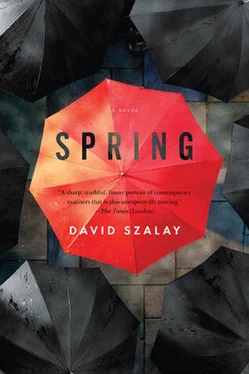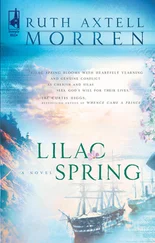‘Yeah.’ Simon nods. ‘That’s what I thought.’
‘There’s talk,’ Piers says, still with his eyes focused somewhere near the horizon, ‘about a heavy-ground Festival.’
‘I heard that. I heard that.’
‘What with all this rain.’
‘That’s right.’
The others are filing out into the twilit yard. Among the workriders are several of Simon’s offspring, and Piers’s son is on Absent Oelemberg, her profile looking like a shadow or silhouette in the frigid half-light. Warren Andrews, the stable jockey, is next, slouched over the withers of his mount. Handsome despite the slaloming nose, Indestructible Warren is the veteran of very many nasty falls. Snapped legs, smashed arms, pierced spleen, punctured lung—he knew what it meant to be mashed into hospital fodder by a storm of pummelling hooves. He is a famished, saturnine figure first thing in the morning. He struggles increasingly with his weight, and needing to do ten stone ten at Fontwell today, he spent most of yesterday in the makeshift sauna he has (an oil-drum filled with stones in his shed), eating nothing except a few Ryvita.
Simon smiles at one of the lasses, a plump teenager in jodhpurs on Mistress Of Arts—Kelly, the daughter of the local farmer from whom he rents this land. In spite of being the fattest workrider, she is the only one who wears jodhpurs. Them, and posh boots, and a purple velvet helmet. Proper little madam, Simon thought, when she first walked into the yard. ‘Alright, Piers,’ he says, and the head lad moves his mount into a walk and leads the slopping string down the lane. When they have left, Simon heaves himself into the old Land Rover, into its comfortless smells of cold oil and suffering canvas, and follows them to the new all-weather gallop—you need them nowadays—on the other side of the swollen stream.
*
It is eight when he steps into the hot kitchen. Mrs Miller has made his fry-up—the plate is waiting in the Aga—and the Racing Post has arrived. When he has eaten, he takes the paper and two Marlboros to the lavatory.
He is still in there twenty-five minutes later when James phones. ‘Oh, she’s fine,’ he says, when James asks after Absent Oelemberg. ‘Fit as a flea, she is.’
‘She is fit this time?’
‘She is.’
‘So…’ James says. ‘If she’s fit… How will you stop her winning?’
‘You don’t need to worry about that,’ Miller says, smearing out the second Marlboro in an ashtray stuck on the toilet-roll holder.
‘She’s not going to win then?’
A short silence. ‘I wouldn’t have thought so.’
When James presses him on how he plans to ensure this, however, Miller just says, ‘Look—you let me worry about that.’
‘Okay,’ James says. ‘I’ll let you worry about it. I’ll see you at the track then. About two o’clock.’
James tries Freddy—who does not answer—and walks Hugo.
When he tries Freddy again an hour later on the way to the tube station, and he still does not answer, he starts to suspect that he will have to travel down to Sussex on his own.
Which is indeed what happens.
The train disembogues from London under an empty March sky. In the middle of a weekday the platforms of south-of-the-river stations are quiet. Nor is the train full, though there are a few other people obviously on their way to Fontwell Park—mostly old men with Racing Posts, and soft sandwiches in Tupperwares, and Thermoses. It has been some time since James has seen a Thermos. Watching an old man pour some tea—or whatever it is—into the plastic mug that doubles as a lid, he thinks of the large tartan one they used to take on family outings in the Seventies. Often he thinks of Katherine. His sense, when he left her flat yesterday morning, that everything was essentially okay has lost much of its positive force since then. It is now as faintly evanescent—there one moment, not the next—as the sunlight on the nodding thickets of withered wild lilac on either side of the tracks, so faint sometimes that it is imperceptible. She did have sex with him on Monday night, when all was said and done. After all the palaver, she did do that. On the other hand, he has not heard from her since, which makes him wonder, as the train winds its way through the post-winter, pre-spring landscape, whether perhaps, when she said she did not think they should see each other for a while, that was in fact what she meant.
The next morning he still has not heard from her. He walks Hugo. The quarter is full of students. On every street, interrupting the sombre London terraces, stand the structures where they study. More than in the past, he sometimes wonders how his life might have turned out if he had been a student himself, if he had not been so impatient, straight from school, to make some sort of mark on the world, and money. Indeed, while he was still at school he had started a salted-snacks wholesale business. North-London newsagents were his trade. He had his own van and he drove it himself, with special permission of the headmaster, who liked his entrepreneurial spirit, and singled it out on Speech Day as being a source of pride to the school and of value to society at large—the year was 1987. Perhaps encouraged by this head-magisterial shout-out in the humid marquee, the summer after his A-levels, instead of taking the usual path to university, he invested his profits in a takeaway-pizza franchise in Islington. Needless to say, he did not imagine spending his life as the proprietor of a pizza-delivery outfit. He was always on the lookout for something new. And then it turned out that one of his employees needed money to finance a film…
On Friday and Saturday nights, when they were open till two, he drove the staff home himself. Eric Garcia, who lived somewhere up the Holloway Road, was usually the last to be dropped. An introverted young man a few years older than James, he had a wide mouth and skin that was somehow simultaneously pallid and olive. He looked, James thought, not unlike a chameleon. He was about as talkative as a chameleon too, and not wanting to sit in silence while they travelled together in the front of the van, James would prod him with questions. ‘Any plans for tomorrow?’ he said one night.
‘Probably writing,’ Eric said, staring through the windscreen. ‘Yeah, writing.’
The light moved to green. ‘Writing what?’
Eric muttered unintelligibly.
‘Sorry?’
‘Just, um… mn… nm.’ Eric seemed to be looking for something that had fallen down the side of the seat.
‘Sorry, I didn’t hear…’
‘Screenplay I’m working on,’ Eric said. ‘You know, developing… nd… yeah…’ His voice trailed off.
‘A screenplay?’
‘Mm…’ He nodded.
‘What sort of screenplay?’
It was a thriller, Eric eventually said.
When he sat down with it a few nights later, James very much wanted to like Eric’s screenplay. Eric even had a director lined up—Julian Shoe—and the following Sunday they met to discuss the project.
With a smile on his bearded face, Shoe did most of the talking. Garcia studied the froth of his pint and piped up only when he was invited to speak. ‘I met Eric through post-production on my short, The Jokers, ’ Shoe said, ‘and he did some special effects, and he had some post-production contacts, and had worked at—was it Harry’s?’
Garcia looked up from his pint. ‘Er—yeah—Harry,’ he said. ‘Paintbox.’
‘Yeh, that’s it.’
‘Harry,’ said Garcia. ‘Harry, yeah.’
‘So I needed special effects and I was introduced to Eric. And he helped finish the special effects, and he had written this wicked script, and you know, when it was time to think about doing a feature we were both of a like mind towards… you know, trying that venture.’
Читать дальше












